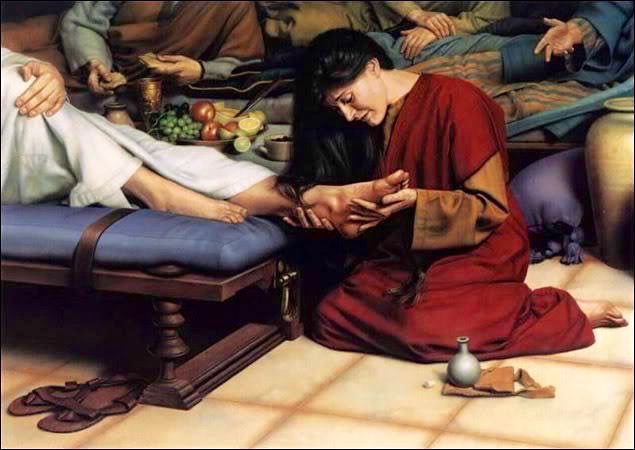“Do you see this woman?” says Jesus in Luke’s version of this story of the anointing of Jesus’ feet.
Epiphany comes from the word for manifestation, not brightness. Can we see the making manifest of beauty or do we just look for sin?
Of course they see this woman. She is a sinner, says Luke’s story (other gospels have the anointing done by a family friend) and so everyone’s eyes are on her. Looking. Perhaps leering. But seeing? Yes. They saw her. Or did they just look at her, seeing what they wanted to see? Most of us would envy such an act if we were honest. Soothing. Calming. Sensual without being erotic. And yet, of course, those who lust for the erotic version will see that, if simply by projection.
So why would Jesus ask such a moronic question about seeing if not to make a point. Perhaps the point is the difference between seeing and looking. Between sin and beauty.
Jesus asks us to stop “looking” and instead, “see.”
One wonders what our church and its liturgies would look like – what our western art would portray – if the central act of Jesus’ presence on earth were not a crucifixion to propitiate or atone for “original sin?” What if the most important epiphany (manifestation) of Jesus – the most vital showing was not death on a cross but rather was how Jesus welcomed connection, hosted it, fostered it, preached about it and finally modeled it in an anointing, during a last supper, on a garbage dump and finally on a beach over breakfast? What if we have, for centuries, missed the point?
What if we were to replace, or at least add to the “confession of sin” in our prayers with a second “Confession of beauty?” What if we could see rather than just look at life?
…“And now let us confess our love of the beauty of God and our neighbor.”
Silent awe may be kept as we begin to see again.
People
Most beautiful God of the Universe,
which is all so very good,
we can see the beauty of creation and so we can see You,
the One who Is.
Splashed with the mud of human evils, still we know that beneath, we can see it shimmer with your beauty. We confess our love of all that is beautiful, sensual, kind and loving.
We know we are not alone, designed as we are to connect.
And we know that we are all doing our very best, even when not good enough.
We have loved you with our whole heart as best we may,
given how life has formed and wounded us.
We have loved our neighbors as best we could,
aware of room for improvement.
We are truly joyful and we humbly see life’s beauty as best we can.
For the sake of your Son, Jesus Christ; have delight in us
and connect with us, that we may delight in You, and in each other,
even in the beauty of your unwillingness
to be named
and so replacing doctrine with mystery;
judgement with beauty.
AMEN
The oldest woman present then stands, or is lifted, and says
May we all be One in the beauty of life. Amen.
The Peace, again.

